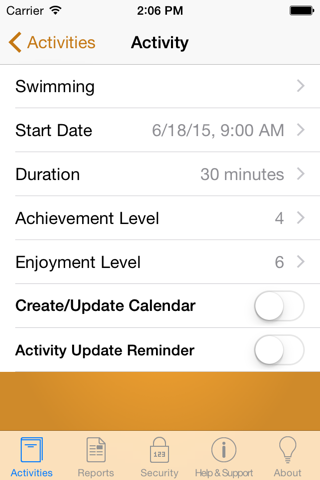
Activity Diary app for iPhone and iPad
Developer: happtic Pty. Ltd.
First release : 30 Jun 2011
App size: 3.71 Mb
An Activity Diary is an important component of CBT treatment for depression and other emotional disorders. This application allows users to:
- schedule activities as future events or input them as past events
- records of the nature of the activity undertaken & the duration of the activity
- users can rate level of Achievement & Enjoyment for each activity
- link the activities to the calendar to remind them of event, & reminders to complete the diary after the activity
- receive positive reinforcing statements following events
- email the completed diary to therapist
- view progress on a graph
People who experience depression will often feel unmotivated, tired, and lose interest in activities that they used to enjoy. This can lead to avoidance of tasks or responsibilities both at home and work, and people may avoid socializing or other enjoyable activities. As tasks build up people can begin to feel overwhelmed and guilty about avoiding these things which may then exacerbate a person’s depressed mood. Behavioural activation is a recognized component of Cognitive Behavioural Therapy for Depression which focuses on activity scheduling to encourage people to approach tasks that they are avoiding, and to increase the activities that they enjoy. It is well established form of treatment for depression, and has been proven as an effective strategy in treatment studies of depression.
An Activity Diary is a standard behavioural activation technique which involves recording activity monitoring, and rating the pleasure and mastery a person feels after completing each activity. To increase flexibility for users, the Activity Diary is designed to allow individuals to enter an activity in the future, or a past event. The diary allows the activity to be entered into the calendar on the iphone which can be set to prompt the user to enter whether the activity was undertaken, the length of time the activity took, and the level of achievement and enjoyment for each activity. The range for Achievement and Enjoyment rating is 0 - 10, with 0 being low (no enjoyment / no achievement) and 10 being the highest rating (most enjoyable / highest achievement). It is recommended that a person using the Activity Diary should enter regular activities, either to be undertaken in the future, or unplanned activities as they occur. The user can also enter notes alongside the rating. The Activity Diary will display data in a graph which makes it much easier to view.
There are two main components of this Activity Diary: Activity monitoring and Activity Scheduling.
1. Activity monitoring involves recording daily activities in a diary format. By doing this it offers both the therapist and the person a look at baseline activity levels, and to explore the relationship between activities, emotions, and thoughts. The activity diary can then be used to highlight any need for problem solving if there are other obstacles that are interfering in planning activities.
2. Activity scheduling is aimed at increasing contact with positive reinforcement in the environment, and increasing a person’s sense of achievement and enjoyment. By increasing enjoyable events, a person’s mood can lift. In addition, by achieving tasks that had been previously avoided, a person’s self belief may improve by challenging negative thoughts about themselves (e.g. I am lazy / useless) and leading to more positive self view and increased hope in the future.
Similar to our other CBT applications, the Activity Diary was designed by an experienced clinical psychologist and CBT therapist who believed that these tools should be available in the most accessible form for individuals to use in today’s fast technological world. The Activity Diary can be used by people in treatment for depression as the Activity Diary to be emailed straight to a therapist or doctor, although the Activity Diary can also be used by those individuals who are embarking on a self-guided course of CBT.



